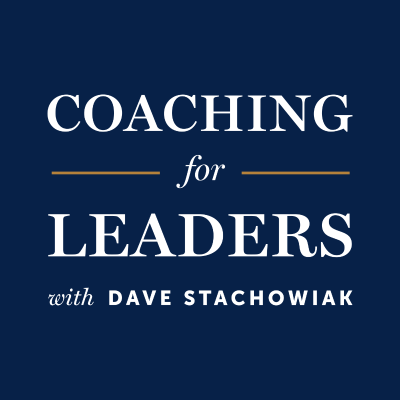
Coaching for Leaders
engelsk
Business
Begrænset tilbud
1 måned kun 9 kr.
Derefter 99 kr. / månedOpsig når som helst.
- 20 lydbogstimer pr. måned
- Podcasts kun på Podimo
- Gratis podcasts
Læs mere Coaching for Leaders
Leaders aren’t born; they’re made. Many leaders reach points in their careers where what worked yesterday doesn’t work today. This Monday show helps leaders thrive at these key inflection points. Independently produced weekly since 2011, Dr. Dave Stachowiak shares insights from a decade of leading a global leadership academy, plus more than 15 years of leadership at Dale Carnegie. Bestselling authors, proven leaders, expert thinkers, and deep conversation have attracted 50 million downloads and over 300,000 followers. Join the FREE membership to search the entire leadership and management library by topic at CoachingforLeaders.com
Alle episoder
845 episoder763: Leading with Poise When the Stakes are High, with Eileen Collins
EILEEN COLLINS: THROUGH THE GLASS CEILING TO THE STARS Colonel Eileen M. Collins, USAF (retired), earned a place in history as the first American woman to pilot, and later to command, a space mission. She flew on the space shuttle four times, twice as commander – including the 2005 “return to flight” mission after the tragic Columbia accident. She is the subject of the documentary movie Spacewoman and author of the book Through the Glass Ceiling to the Stars: The Story of the First American Woman to Command a Space Mission (Amazon [https://amzn.to/4pxBeq2], Bookshop [https://bookshop.org/a/90226/9781950994052])*. We all have times in our careers where all eyes are on us. In this conversation, Eileen and I explore the critical moments of her career and how she stayed grounded while soaring among the stars. KEY POINTS * Until we are tested, we don’t know what we are capable of. * Nerves creep in at times for all of us. When they do, it’s helpful to think about representing your role instead of representing yourself. * When decisions become difficult, always come back to, “What’s the mission?” * Train for the skill, not for the task. * During high-stakes times, remember your family and personal life. They will help you stay grounded. RESOURCES MENTIONED * Through the Glass Ceiling to the Stars: The Story of the First American Woman to Command a Space Mission by Eileen Collins (Amazon [https://amzn.to/4pxBeq2], Bookshop [https://bookshop.org/a/90226/9781950994052])* * Spacewoman documentary [https://spacewoman.film], featuring Eileen Collins INTERVIEW NOTES Download my interview notes [https://coachingforleaders.com/mp-files/eileen-collins-leading-with-poise-when-the-stakes-are-high.pdf/] in PDF format (free membership required). RELATED EPISODES * How to Lead and Retain High Performers, with Ruth Gotian [https://coachingforleaders.com/podcast/lead-retain-high-performers-ruth-gotian/] (episode 567) * The Way to Handle Q&A, with Matt Abrahams [https://coachingforleaders.com/podcast/handle-q-and-a-matt-abrahams/] (episode 681) * How to Start the Top Job, with Scott Keller [https://coachingforleaders.com/podcast/how-to-start-the-top-job-scott-keller/] (episode 752) DISCOVER MORE Activate your free membership [https://coachingforleaders.com/free] for full access to the entire library of interviews since 2011, searchable by topic. To accelerate your learning, uncover more inside Coaching for Leaders Plus [https://coachingforleaders.com/plus].
762: Show Up Better, Faster, with Claude Silver
CLAUDE SILVER: BE YOURSELF AT WORK Claude Silver is on a mission to revolutionize leadership, talent, and workplace culture. She is Chief Heart Officer at VaynerX and partners with CEO Gary Vaynerchuk to drive their success. Claude has earned Campaign US’s Female Frontier Award, and AdWeek’s Changing the Game Award and she’s the author of Be Yourself at Work: The Groundbreaking Power of Showing Up, Standing Out, and Leading from the Heart (Amazon [https://amzn.to/47VCSfp], Bookshop [https://bookshop.org/a/90226/9780063392434])*. We’ve all heard the advice to be ourselves at work. It’s easier said than done. In this conversation, Claude and I explore how we can actually move past some of the unhelpful self-talk so that we can show up better, faster. KEY POINTS * We all have songs that play in our heads. When the song isn’t working, it’s time to change it. * Labels are for soup cans, not people. Stop treating negative self-talk as gospel. * Begin by identifying the label you’ve put on yourself that’s harming you. When it’s hard to see a harmful label, use times of either reflection or agitation to help surface it. * Find the internal evidence for this label and record what confirms this belief and also what challenges it. If that’s hard, invite someone else (a partner, friend, or therapist) to help you see it more objectively. * Evolve by creating a new mantra for who you are becoming. If it doesn’t seem doable today, ask yourself if you can envision it being true in the future. RESOURCES MENTIONED * Be Yourself at Work: The Groundbreaking Power of Showing Up, Standing Out, and Leading from the Heart by Claude Silver (Amazon [https://amzn.to/47VCSfp], Bookshop [https://bookshop.org/a/90226/9780063392434])*. INTERVIEW NOTES Download my interview notes [https://coachingforleaders.com/mp-files/claude-silver-show-up-better-faster.pdf/] in PDF format (free membership required). RELATED EPISODES * How to Tame Your Inner Critic, with Tara Mohr [https://coachingforleaders.com/podcast/232/] (episode 232) * How to Stand Up for Yourself, with Sunita Sah [https://coachingforleaders.com/podcast/stand-up-for-yourself-sunita-sah/] (episode 715) * When It Feels Like You Don’t Belong, with Muriel Wilkins [https://coachingforleaders.com/podcast/when-you-dont-belong-muriel-wilkins/] (episode 756) DISCOVER MORE Activate your free membership [https://coachingforleaders.com/free] for full access to the entire library of interviews since 2011, searchable by topic. To accelerate your learning, uncover more inside Coaching for Leaders Plus [https://coachingforleaders.com/plus].
Listener Survey Results
Dave shares the results of the 2025 listener survey and previews what’s next for Coaching for Leaders. If you’re not already getting the weekly update and wish to receive Dave’s forthcoming FocusFive messages, join the free membership for access [https://coachingforleaders.com/register/free-membership/].
761: Notice Disruption and Innovate Through It, with Steve Blank
STEVE BLANK: BLIND TO DISRUPTION Steve Blank is an Adjunct Professor at Stanford and co-founder of the Gordian Knot Center for National Security Innovation. Credited with launching the Lean Startup movement and the curriculums for the National Science Foundation Innovation Corps and Hacking for Defense and Diplomacy, he’s changed how startups are built, how entrepreneurship is taught, how science is commercialized, and how companies and the government innovate. Steve is the author of The Four Steps to the Epiphany and The Startup Owner’s Manual and is the author of his recent article at steveblank.com: Blind to Disruption: The CEOs Who Missed the Future [https://steveblank.com/2025/07/08/blind-to-disruption-the-ceos-who-missed-the-future/]. Leaders may see the future coming, but we aren’t always incentivized to act on it. In this conversation, Steve and I discuss what we can learn from the common patterns of disruption so we don’t miss what’s next. KEY POINTS * In the 1890s, there were approximately 4,000 carriage and wagon makers in the United States. Only one company made the transition to automobiles. * In each of the three companies that survived, it was the founders, not hired CEOs, that drove the transition. * Studebaker recognized that it wasn’t in the business of carriages; it was in the business of mobility. * Clayton Christensen taught us that disruption begins with inferior products that incumbents don’t take seriously. * The real problem isn’t that companies can’t see the future. It’s that they are structurally disincentivized to act on it. * Parsing innovation theatre vs. innovation means paying attention to what’s actually shipping. If nothing is and you want to innovate, look elsewhere. * Bubbles in the market are normal. Timing may be off, but that doesn’t mean disruption isn’t happening. RESOURCES MENTIONED * Blind to Disruption: The CEOs Who Missed the Future [https://steveblank.com/2025/07/08/blind-to-disruption-the-ceos-who-missed-the-future/] by Steve Blank RELATED EPISODES * How to Start Seeing Around Corners, with Rita McGrath [https://coachingforleaders.com/podcast/seeing-around-corners-rita-mcgrath/] (episode 430) * How to Build an Invincible Company, with Alex Osterwalder [https://coachingforleaders.com/podcast/invincible-company-alex-osterwalder/] (episode 470) * How to Pivot Quickly, with Steve Blank [https://coachingforleaders.com/podcast/pivot-quickly-steve-blank/] (episode 476) DISCOVER MORE Activate your free membership [https://coachingforleaders.com/free] for full access to the entire library of interviews since 2011, searchable by topic. To accelerate your learning, uncover more inside Coaching for Leaders Plus [https://coachingforleaders.com/plus].
760: The Kind of Curiosity Leaders Often Miss, with Shannon Minifie
SHANNON MINIFIE: BOX OF CRAYONS Shannon Minifie is the CEO of Box of Crayons, a learning and development company that helps unleash the power of curiosity to create connected and engaged company cultures. They are the organization behind the bestselling book The Coaching Habit by Michael Bungay Stanier. Shannon and her team recently released a report along with the Harris Poll titled Navigating a Fractured Workplace: How Relational Curiosity increases engagement, trust, and productivity [https://boxofcrayons.com/#whitepaper]. Of course, you’ve heard that being curious and coach-like will help in leadership. But sometimes the very thing we think we’re doing well is actually getting in the way. In this conversation, Shannon and I explore the kind of curiosity that leaders often miss. KEY POINTS * 5-6 hours of the average workweek is lost to the fear of making mistakes. * A strong majority of leaders say employees are expressing a desire for more feedback, and a majority also say that people are unable to receive hard feedback. * Relationships are the core of these conflicting messages. Without a relationship of trust, helpful feedback often doesn’t land that way. * Intellectual curiosity helps us learn what we don’t know. Relationship curiosity helps the other person learn what they don’t know. * Ask yourself: what is my goal in asking this question? * Rather than asking a question that starts with a “why,” consider asking a question that starts with a “what.” The 7 Essential Questions: 1. What’s on your mind? 2. And what else? 3. What’s the real challenge here for you? 4. What do you want? 5. How can I help? 6. If you’re saying yes to this, what are you saying no to? 7. What was most useful for you? RESOURCES MENTIONED * Navigating a Fractured Workplace: How Relational Curiosity Increases Engagement, Trust, and Productivity [https://boxofcrayons.com/#whitepaper]. * Interactive Learning Preview: Invest in the Power of Curiosity [https://learn.boxofcrayons.com/ilp_registration] * The Coaching Habit [https://bookshop.org/a/90226/9780978440749]* by Michael Bungay Stanier INTERVIEW NOTES Download my interview notes [https://coachingforleaders.com/mp-files/shannon-minifie-the-kind-of-curiosity-leaders-often-miss.pdf/] in PDF format (free membership required). RELATED EPISODES * These Coaching Questions Get Results, with Michael Bungay Stanier [https://coachingforleaders.com/podcast/237/] (episode 237) * How to Ask Better Questions, with David Marquet [https://coachingforleaders.com/podcast/ask-better-questions-david-marquet/] (episode 454) * The Way to Be More Coach-Like, with Michael Bungay Stanier [https://coachingforleaders.com/podcast/more-coach-like-michael-bungay-stanier/] (episode 458) DISCOVER MORE Activate your free membership [https://coachingforleaders.com/free] for full access to the entire library of interviews since 2011, searchable by topic. To accelerate your learning, uncover more inside Coaching for Leaders Plus.
Vælg dit abonnement
Begrænset tilbud
Premium
20 timers lydbøger
Podcasts kun på Podimo
Gratis podcasts
Opsig når som helst
1 måned kun 9 kr.
Derefter 99 kr. / måned
Premium Plus
100 timers lydbøger
Podcasts kun på Podimo
Gratis podcasts
Opsig når som helst
Prøv gratis i 7 dage
Derefter 129 kr. / month
1 måned kun 9 kr. Derefter 99 kr. / måned. Opsig når som helst.

































